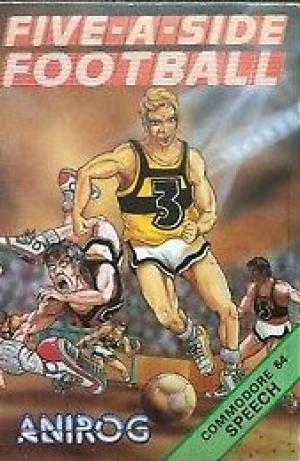

Platform: Commodore 64
Region: Region Not Set
Publishers(s): Anirog Software
ReleaseDate: 1985-01-01
Players: 1
Co-op: No
5 aside football
The game's presentation is very similar to Soccer's, with a one or two player option and a scrolling panoramic view of the pitch. The usual two-player option is present and there's also four levels of the computer to challenge you. There are crowds at both ends and on the far touchline, which move about and make a noise when you score. They also shout 'here we go' six times every time there's a kick-off. Controlling a player is quite easy. From kick off you are allocated a man and he is put under your control. You can run him about the pitch and chase your opponent. If the opponent kicks the ball and it lands near a player on your team, then the computer will automatically switch the control to the man nearest the ball. Using this method you can actually pass the ball around the pitch and set up moves. If your player moves off screen, then again control will be automatically switched to another player. Winning the ball in a tackle is quite tricky - you have to run over the ball when it is in the opponent's possession. Do it correctly and the ball will switch from his control to yours and you can then pass it or charge up the field towards the goal. Passing is easy, just press the fire button when the ball is under your control, the longer you keep the fire button pressed the longer the pass will be. A novel feature in this game is fouling - just run up behind an opponent and press the fire button; if you are successful then you'll trip him up. Do this too many times and you will have a penalty awarded against you for 'roughing'. The actual game characters aren't as big as the ones on the Commodore, but this seems to make the playing area a lot bigger than it is (scrolling three screen-length pitch). A nice feature is a penalty option - this is a game in itself and allows you to take penalties against the computer or a friend. When you choose this option, the screen goes to a view seen from the front of the goal. The penalty taker can move the joystick left or right to kick the ball in that direction. The goalkeeper has similar control and although it is possible to wait until the ball is kicked and see which way it is going, it is usually better to guess. If the game ends in a draw, then the decider is a penalty kick off. This is a nice feature and a good change from the usual extra time system at the end of a drawn match.
ESRB Rating: E - Everyone
Genre(s): Sports